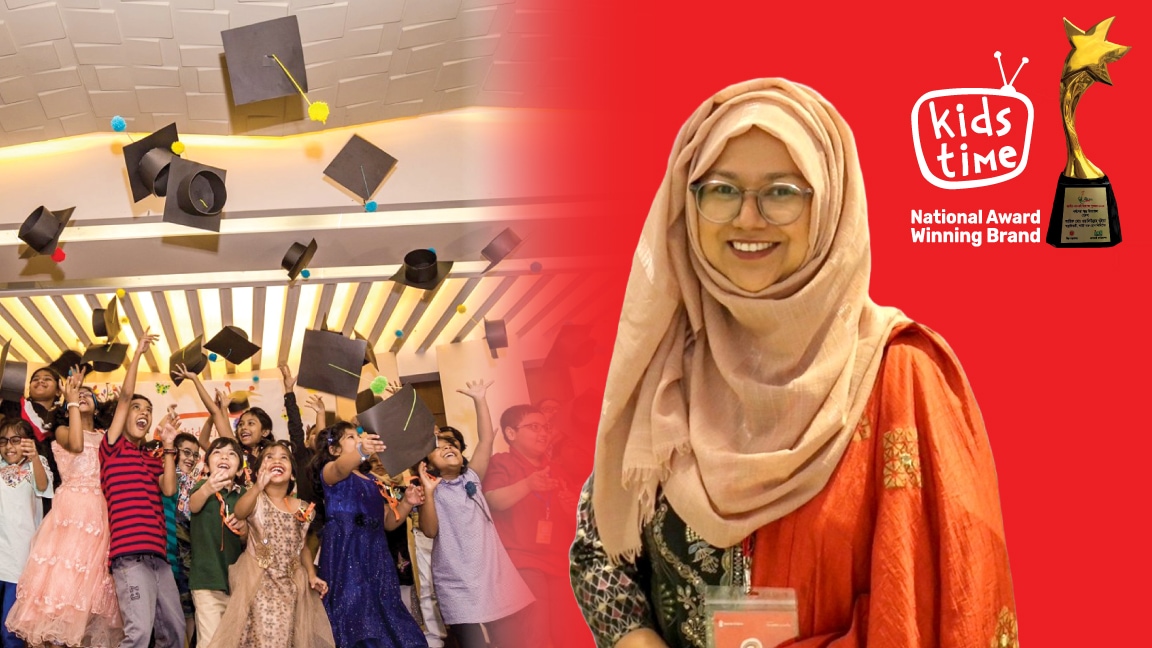
The traditional education system, with its emphasis on rote memorization, faces mounting criticism for failing to prepare children for an uncertain future. A 2016 World Bank report highlighted this challenge, noting that children entering school that year would graduate into a job market where many positions didn't yet exist.
More importantly, a growing base of research indicates that the secret of how our life turns out lies in the shape and experiences of our childhood. The seeds of what we eventually become in life can almost always be traced back to our early years. These findings have created an urgency to put greater importance on early childhood development. Consequently, a growing number of parents today are wary about the early development of their children. There is an increasing demand for children's education initiatives that understand and incorporate early childhood development psychology in their programs.
This reality underpins the founding thesis of Kids Time, a creative learning institution in Bangladesh that focuses on cultivating children's creativity and problem-solving skills through interactive and engaging education approaches. Owned by Dhaka-based education conglomerate Light of Hope, the organization has quietly built one of the most popular creative after-school brands in Bangladesh.
Founded in 2016 by Tahmina Rahman, a pharmacist and a population science graduate from Dhaka University, whose volunteer work with Light of Hope’s Porua Project revealed the scarcity of quality literature and educational programs for children in Bangladesh. This experience, along with her personal love of reading and her observations of children's enjoyment of crafts, sparked the idea for Kids Time.
Initially, Kids Time was conceived as a space for children to enjoy creative pursuits like crafting and have fun. The premise was simple: children learn best through play and exploration.
"The idea was to create a fun space, a space of joy for children. It wasn't about teaching them specific things; the focus was on them having a happy time", says Tahmina, reflecting on the organization's initial motivation.
However, this initial aspiration—offering classes on crafting—quickly expanded as Tahmina and her team recognized the need for a more structured approach to equip children with essential skills necessary to thrive in a constantly changing world. Crafting alone couldn't fulfill this expanded vision.

“We realized we need to go beyond crafting,” explains Tahmina. This led to the development of a more comprehensive learning approach. "From that point on, we decided to focus on four skills: creativity, problem-solving skills, moral values, and emotional intelligence. Globally, after-school brands like Kumon and Aloha were focusing on math. But my focus was on more fundamental skills like creativity, problem-solving, etc.”
Bangladesh is experiencing a major economic and cultural shift that began decades ago. The nation's strong growth puts it on track to become a trillion-dollar economy by 2040. A new middle class has emerged, with more money to spend than ever before. Since 1990, Bangladesh's focus on education has paid off, especially in getting more children into primary schools. People now widely recognize the value of education.
The country's parents have changed too. Today's generation of parents is educated and globally aware. They take an active role in their children's learning. Unlike their own parents, they understand child development and won't leave their children's education to chance.
This rising demand for better education has brought many new programs to Bangladesh, including international names like Kumon and Aloha. Despite these options, the country lacks quality preschool and after-school programs that truly understand child development. Most existing programs simply add to regular schoolwork.
This gap creates an opportunity for institutions like Kids Time that can offer both early childhood education and essential skills training. By teaching creativity and problem-solving alongside core subjects like language and math, institutions like Kids Time provide what today's parents seek.
Kids Time's journey began modestly with workshops held in restaurants in Uttara and Dhanmondi in 2016, teaching children art and craft skills while simultaneously engaging parents in sessions focused on spending quality time with their children. The positive response led to the launch of its first month-long course in 2017.
Tahmina reminiscences: “I started my journey with 10 children and parents attending a 2-hour crafting session in a Restaurant in Dhaka back in 2016. That idea eventually turned into Kids Time.”
The organization grew steadily, expanding to eight branches across Dhaka by 2019. The initial four branches served as a learning curve, allowing the team to refine their curriculum and content development process. The subsequent four branches, established between August 2019 and February 2020, benefited from this refined approach.
When COVID-19 hit in 2020, it posed the first major existential threat to Kids Time, forcing the closure of all branches. The initial months of the pandemic were extremely difficult for Kids Time. However, rather than surrendering to the challenge, the team turned this adversity into an opportunity for innovation. Within two months, they successfully transitioned their entire program online. This transition demanded significant adaptation. A steep learning curve followed, encompassing technological training, content adaptation, and logistics for delivering materials to teachers and students at home.
Despite the challenges, Kids Time remained meticulous about delivering quality. It capped online classes at nine students to ensure each child received adequate attention, a common limitation of online learning.
Today, Kids Time operates two physical centers in Dhaka's Dhanmondi and Khilgaon areas. These centers offer all six courses, with the newly launched Spoken English and Singapore Math programs. These courses meet twice a week.
Kids Time offers four of its courses online: Art & Crafts, Drawing, Singapore Math, and Spoken English, providing an alternative for families who prefer remote learning or do not have access to a physical center.
More than 5000 students graduated from its various courses. The institution maintains accessible pricing, with online courses ranging from 1,500 to 2,500 Bangladeshi Taka and offline courses from 2,000 to 3,000 Taka.
To make its program accessible to more people, Kids Time is now offering franchise opportunities to interested groups across Bangladesh. The institution has taken a strategic decision to scale to 1000 centers across Bangladesh in the next 10-15 years.
Kids Time distinguishes itself from other institutions through its unique approach to learning, which is deeply rooted in understanding child development.
For instance, in its storytelling classes, children are divided into groups and provided with baskets of toys. They then create stories using these toys, fostering their imagination and communication skills. The children draw illustrations based on their stories, culminating in the creation of storybooks. These storybooks are later published, offering children a tangible outcome of their creative process and further encouraging their creative journey.
In its classroom design, shared art supplies are provided, encouraging collaboration and communication among children. Mixed-age groups are intentionally formed to promote interaction and emotional bonding between children of different ages.
Students' progress is assessed by observing their gradual improvement in creativity and problem-solving abilities. The achievements of students are celebrated through various initiatives, such as publishing their work in magazines.
Kids Time also organizes ‘Kids Time Fair’ - the country’s largest kids event to celebrate their creativity. This three-day event attracts 20,000 families each year, organized at Bangladesh Shishu Academy.
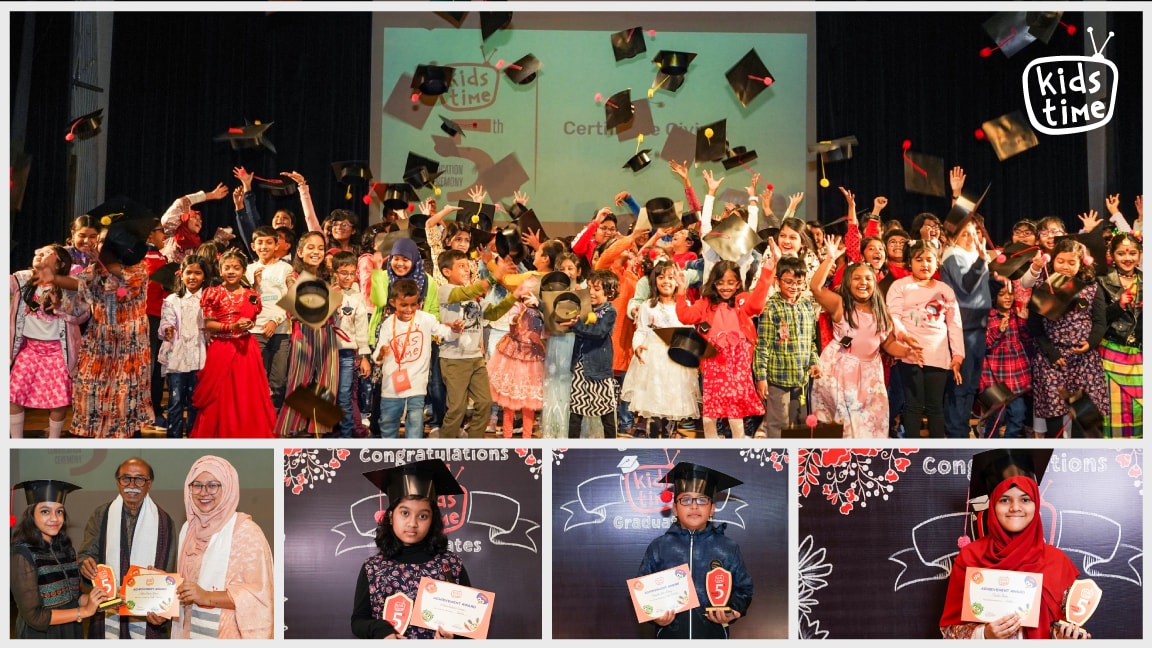
Kids Time's educational approach centers on four key skills. The institution posits that by developing these skills, children will be better equipped to adapt to change, learn new things, and thrive in a constantly evolving world. These four skills are:
Kids Time offers courses for children aged three to twelve, grouping them according to their abilities and developmental needs. The institution takes a holistic approach to child development. It recognizes that children's development is interconnected and that cultivating creativity and a love of learning requires supporting children in all areas of their development.
Learning experiences are tailored to specific developmental stages. Programs and courses are designed to be engaging and fun. Hands-on activities are used to teach math concepts, language skills, and storytelling. Techniques like having children share art supplies, mixed-age learning groups, and tactile learning aids are used to promote collaboration, communication, and emotional bonding. Learning environments are designed to engage children's senses.
The institution offers two main program types: after-school programs and pre-school programs.
After-School Programs (Ages 4-12): After-school programs offer a wider range of courses, including crafting, drawing, story-making, Singapore Math, and spoken English.
Designed for school-aged children, the program provides them with a creative outlet after their regular school day and a continuation of the nurturing environment cultivated in the preschool program.
Kids Time offers a range of courses:
Art & Crafts: This program, highly popular among parents and students, aims to develop children's fine motor skills, encourage creative expression, and introduce them to different artistic techniques. The curriculum uses a wide range of materials and techniques to encourage creative exploration and problem-solving. Children are allowed to "destroy" materials as they learn, understand how different materials react, and discover new ways to manipulate them.
Drawing: Kids Time believes that every child has artistic potential and that drawing can be a powerful tool for developing creativity and self-expression. This program focuses on developing children's ability to observe, imagine, and express themselves visually.
Story Making: This unique program allows children to create their own stories, encouraging imagination, language development, and storytelling skills. It includes hands-on activities like creating characters with toys, drawing scenes, and presenting their stories to the class. The final products are often compiled and published as books, giving children a tangible sense of achievement and the pride of authorship.
Singapore Math Course: Kids Time introduced Singapore Math in Bangladesh. Developed based on the National Curriculum of Singapore that helped Singapore’s students to top global ranking for the last 20 years. Recently, the National Curriculum of Bangladesh also adopted their method. This program prepares children for real life by improving their fundamental math concepts using an innovative hands-on, interactive approach. This is now offering an alternative to Kumon or Aloha for teaching math to children in Bangladesh.
Joy School Spoken English: Kids Time brought the Joy School English franchise to Bangladesh, a USA-based company that is operating in 30 countries. To make English language learning more accessible and offer international programs to Bangladeshi children, the Joy School English program was launched in 2021. The students learn to speak English in native dialect and practice speaking on the App, besides direct classes taken by trained English teachers.
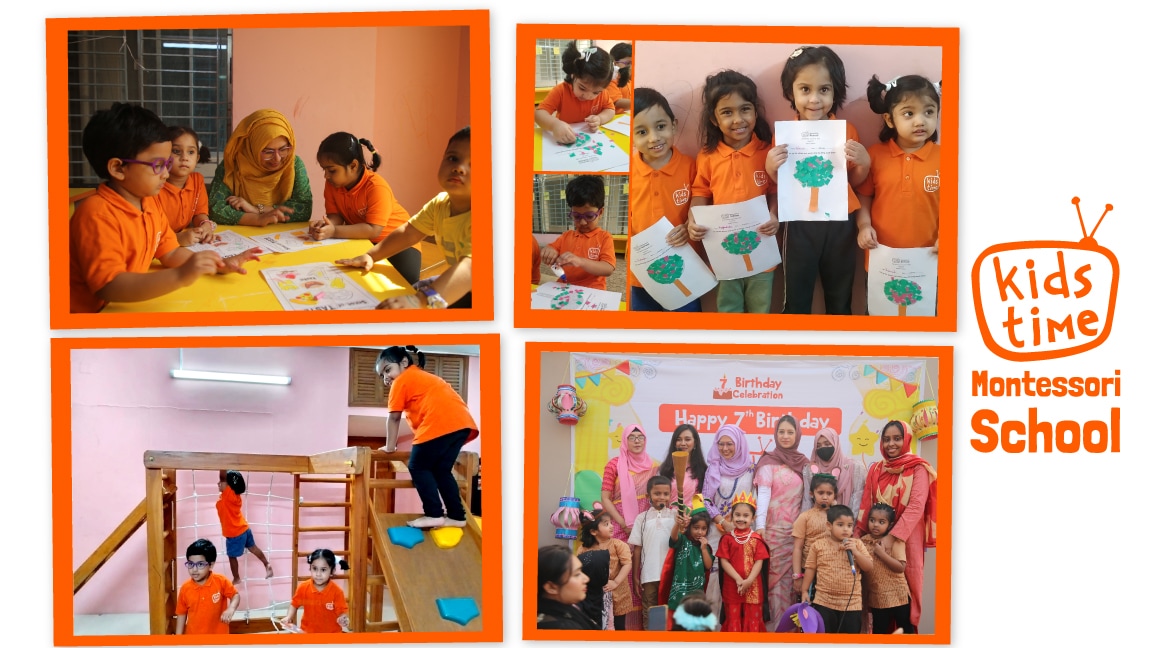
Preschool Program (Ages 3-6): Along with its growing after-school program, Kids Time has recently launched its pre-school program.
Kids Time's preschool program embraces a child-centered approach to learning, with the Montessori method at its core, which encourages self-directed learning and exploration.
The program focuses on developing essential skills across four key developmental domains—physical, cognitive, social, and linguistic while integrating elements that promote creativity, cultural awareness, and reading habits. Tahmina explains, "We design our classrooms, play zones, and activities based on these four developmental domains."
Besides courses, Kids Time has also developed a range of learning products focusing on math, art, craft and creative activity based on its own curriculum. These products are available across Kids Time centers, online and also at select retail outlets across the country.
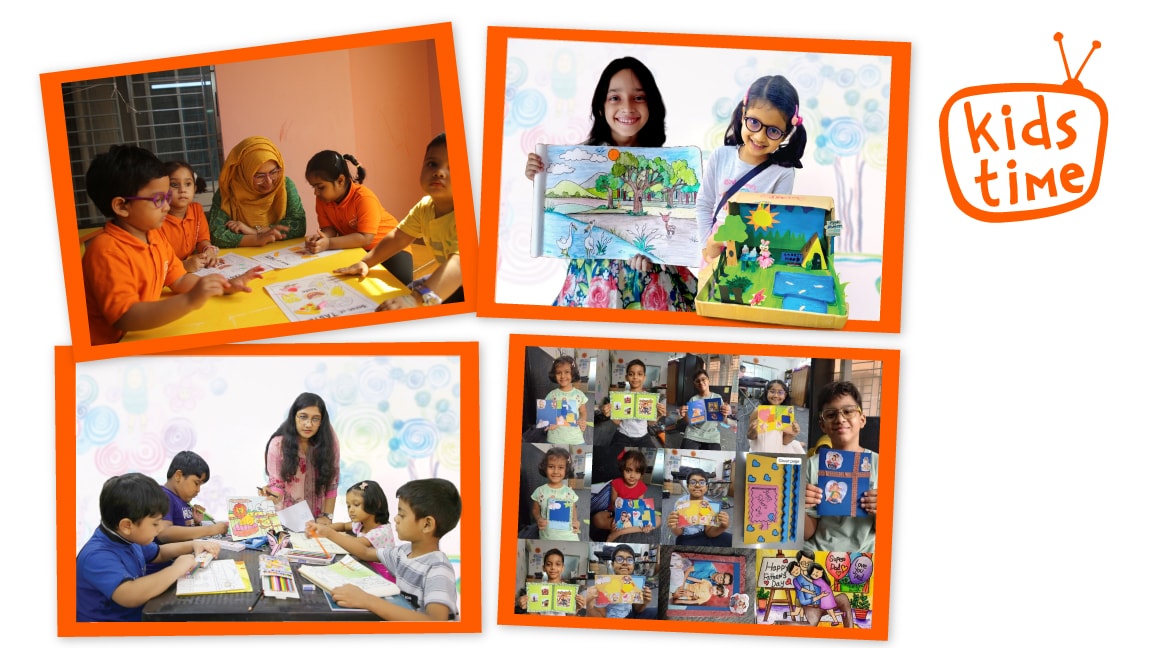
Early childhood development is fast becoming a science. A growing body of research suggests that early childhood education effectiveness depends on a whole host of aspects—the developmental stage of a child, temperament, individual proclivity, approach of the teachers, and so on. Unfortunately, most traditional educational settings in Bangladesh tend to overlook these demands. Instead, they apply the same structured and rote memorization-centric approach to childhood education, which, in many instances, makes kids fearful of learning, causing more harm than good.
To that end, Kids Time has been an exception. Kids Time wants to make learning joyful to kids, encouraging kids to seek out learning opportunities and operate in a self-driven manner.
The institution has developed a teaching philosophy rooted in childhood development principles. Its curriculums are informed by research on child development, global trends in education, and the needs and challenges of children in Bangladesh.
Kids Time centers are designed to be engaging. Educational materials are designed in-house and are exceptionally high-quality. Instead of rote memorization, play-based learning, exploration, and hands-on activities are encouraged.
Children at Kids Time's program are empowered and encouraged to complete tasks by themselves. Instead of dictating, teachers provide children with tools and resources to explore and discover on their own. This helps build self-reliance, allowing children to develop confidence in their ability to learn and solve problems independently. This in turn makes happy learners.
From joyful learning, individualized teaching, and group projects that encourage teamwork to parental involvement, Kids Time has developed a teaching approach that meets the demand of child development principles and is unique in Bangladesh.
In this section, we make an attempt to break down different aspects of Kids Time's education philosophy:

Kids Time's teaching philosophy seeks to empower children to become confident, creative, and adaptable learners. The focus is not just on imparting mere knowledge, but on developing the skills and mindset that will allow children to thrive in an uncertain future.
Kids Time is a young organization, a toddler at best. While it has built a strong institutional foundation and a growing reputation as a creative after-school program, the institution also faces several critical challenges.
Finding and retaining qualified teachers with the proper understanding of child development is not easy. Kids Time has established its own teachers training initiative but scaling teachers is a hard problem.
The second challenge comes from the societal attitudes towards early childhood education. Many parents still prioritize traditional academic skills over creative development. Others simply don’t take early childhood development seriously enough. Kids Time seeks to address this through ongoing parent communication, community outreach, and advocacy for early childhood education.
Finally, exposure to digital devices is changing the cognitive patterns of children, making engaging children in creative, hands-on activities a challenge. Kids Time advocates for parents to limit screen time and create environments that encourage creative exploration. The organization's emphasis on low-cost, readily available materials for activities aims to make it easier for parents to encourage creativity at home.
While Kids Time faces certain challenges, the institution is sitting on a massive opportunity. There is a growing demand for alternative education. More and more parents are now aware of the importance of early childhood development. Moreover, there is an increasing awareness of traditional education's limitations. These factors combined have been driving a growing demand for high-quality alternative children's education programs that focus on creativity and enduring life skills. Kids Time has created a perfect program that can meet this need. The timing for Kids Time couldn’t have been better.
Kids Time's long-term strategic ambition is to become a leading force in shaping the future of early childhood education in Bangladesh, advocating for the integration of creative learning methodologies into mainstream education.
The institution views its role as a catalyst for positive change in how society approaches early childhood education. Kids Time hopes to see its philosophy, and the practices it inspires, become more widely adopted, leading to a future where children are empowered to become creative, confident, and adaptable individuals prepared for the challenges and opportunities of the 21st century.
In the immediate term, Kids Time aims to make its programs accessible to a wider range of children, both within Dhaka and beyond through franchising and online courses. The institution aims to establish 25 franchises by 2025. Kids Time believes that creativity is not a privilege but a fundamental right of every child in Bangladesh.
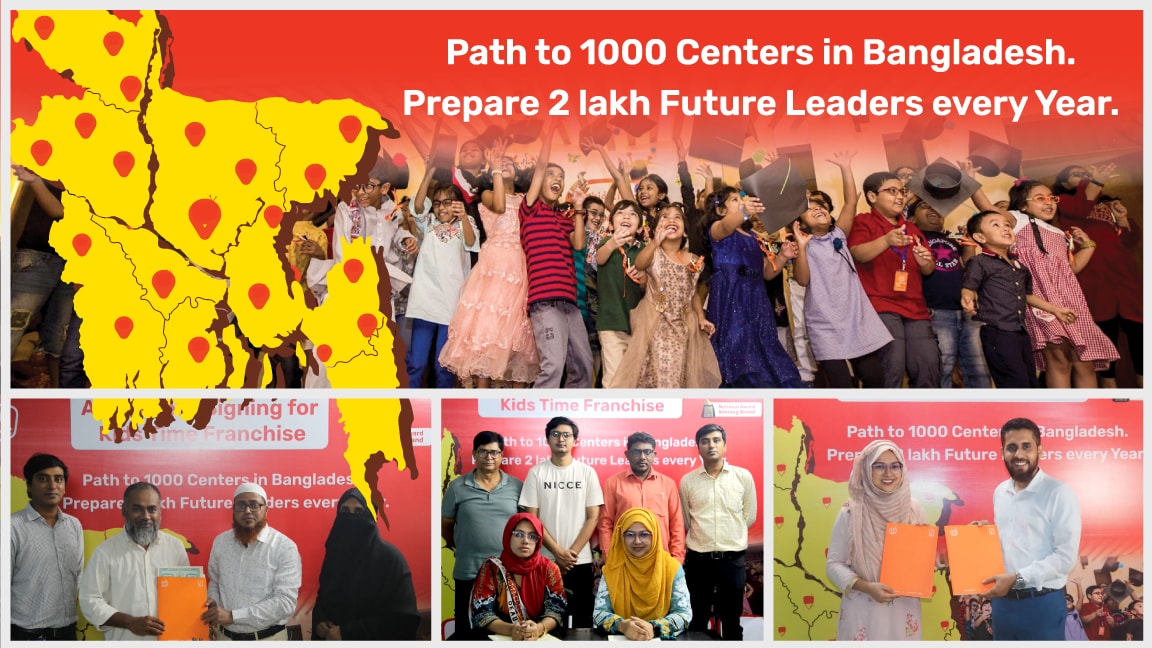
From its humble beginning as a workshop in a Dhaka restaurant to its current status as a comprehensive children's educational institution, Kids Time's journey offers valuable insights into the possibilities and challenges of reimagining early childhood education in developing economies. If successful, Kids Time can become a case that illustrates how local educational innovations can emerge from recognizing gaps in traditional systems, and evolve into comprehensive educational models.
